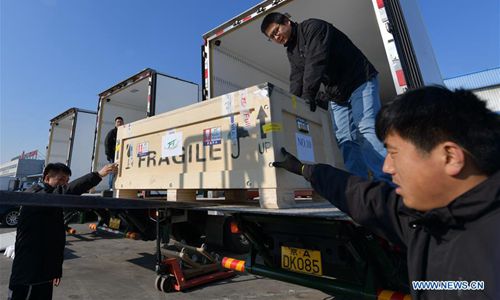HOME >> CHINA
Turkey returns historic artifacts more than 1,000 years old to China
Source:Global Times Published: 2019/11/26 20:08:41

Logistics staff load Chinese cultural relics transported from Italy, which have been cleared by the customs, into trucks, at Beijing International Airport in Beijing, capital of China, April 10, 2019. A total of 796 Chinese cultural relics arrived at Beijing International Airport at 6:54 a.m. after an eight-hour flight from Italy. The group of Chinese artifacts were first noticed by a unit of Carabinieri, or the national gendarmerie of Italy, on the local relics auction market in 2007, which was followed by a domestic judicial trial. (Photo:Xinhua)
Turkey returned two Chinese cultural relics to the Chinese Embassy in Turkey in Ankara on Monday, the first time for Turkey to do so, China Central Television (CCTV) reported on Tuesday.
The two relics are a wall painting from the Tang Dynasty (618-907) and a terracotta figurine from between the late Northern Dynasties (386-581) to the Sui Dynasties (581-618). The two cultural relics are over 1,000 years old. Despite being found in Turkey, the relics have been listed as items banned from going abroad.
Deng Li, China's Ambassador to Turkey, was cited as saying that Turkey found the two relics in November 2018. As a country which has suffered the same pain of seeing many treasures scattered abroad, Turkey kept in touch with China, and both sides made efforts in returning the relics.
Minister of the Turkish Cultural and Tourism, Mehmet Ersoy was cited by CCTV as saying that this cooperation could set an example for other countries and promote more cooperation between China and Turkey in many fields, including cultural and tourism.
China and Turkey signed an agreement on preventing the illicit trafficking of cultural property in 2009, according to CCTV.
According to incomplete data, there are more than 10 million pieces of cultural relics collected by foreign institutions or collectors. China is working to bring these treasures home, CCTV reported.
RELATED ARTICLES:
Posted in: IN-DEPTH